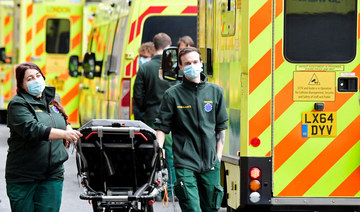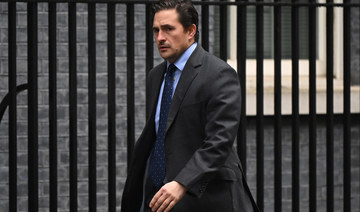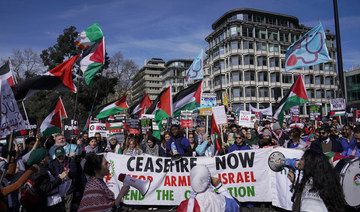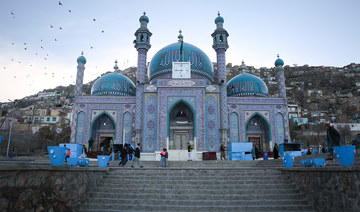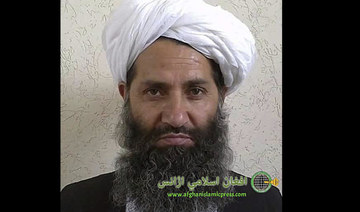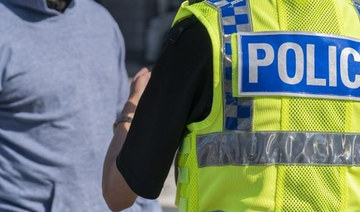STRASBOURG, France: A World Health Organization official warned last week of a “closing window of opportunity” for European countries to prevent their health care systems from being overwhelmed as the omicron variant produces near-vertical growth in coronavirus infections.
In France, Britain and Spain, nations with comparatively strong national health programs, that window may already be closed.
The director of an intensive care unit at a hospital in Strasbourg is turning patients away. A surgeon at a London hospital describes a critical delay in a man’s cancer diagnosis. Spain is seeing its determination to prevent a system collapse tested as omicron keeps medical personnel off work.
“There are a lot of patients we can’t admit, and it’s the non-COVID patients who are the collateral victims of all this,” said Dr. Julie Helms, who runs the ICU at Strasbourg University Hospital in far eastern France.
Two years into the pandemic, with the exceptionally contagious omicron impacting public services of various kinds, the variant’s effect on medical facilities has many reevaluating the resilience of public health systems that are considered essential to providing equal care.
The problem, experts say, is that few health systems built up enough flexibility to handle a crisis like the coronavirus before it emerged, while repeated infection spikes have kept the rest too preoccupied to implement changes during the long emergency.
Hospital admissions per capita right now are as high in France, Italy and Spain as they were last spring, when the three countries had lockdowns or other restrictive measures in place. England’s hospitalization rate of people with COVID-19 for the week ending Jan. 9 was slightly higher than it was in early February 2021, before most residents were vaccinated.
This time, there are no lockdowns. The Institute for Health Metrics and Evaluation, a population health research organization based at the University of Washington, predicts that more than half of the people in WHO Europe’s 53-country region will be infected with omicron within two months.
That includes doctors, nurses and technicians at public hospitals.
About 15 percent of the Strasbourg hospital system’s staff of 13,000 was out this week. In some hospitals, the employee absentee rate is 20 percent. Schedules are made and reset to plug gaps; patients whose needs aren’t critical must wait.
The French public hospital’s 26 ICU beds are almost all occupied by unvaccinated patients, people ”who refuse care, who refuse the medicine or who demand medicines that have no effectiveness,” Helms said.
She denied 12 requests for admission Tuesday, and 10 on Wednesday night.
“When you have three patients for a single bed, we try to take the one who has the best odds of benefiting from it,” Helms said.
In Britain, like France, omicron is causing cracks in the health system even though the variant appears to cause milder illness than its predecessors. The British government this month assigned military personnel, including medics, to fill in at London hospitals, adding to the ranks of service members already helping administer vaccines and operate ambulances.
At the Royal Free Hospital in London, Dr. Leye Ajayi described a patient who faced delays in his initial cancer diagnosis.
“Unfortunately, when we eventually got round to seeing the patient, his cancer had already spread,” Ajayi told Sky News. “So we’re now dealing with a young patient in his mid-50s who, perhaps if we’d seen him a year ago, could have offered curative surgery. We’re now dealing with palliative care.”
Nearly 13,000 patients in England were forced to wait on stretchers more than 12 hours before a hospital bed opened, according to figures released last week from the National Health Service.
Britain has a backlog of around 5.9 million people awaiting cancer screenings, scheduled surgeries and other planned care. Some experts estimate that figure could double in the next three years.
“We need to focus on why performance has continued to fall and struggle for years and build the solutions to drive improvement in both the short and long term,” said Dr. Tim Cooksley, president of the Society for Acute Medicine.
Having the capacity to accommodate a surge is crucial, and it’s just this surge capacity that many in Europe were surprised to learn their countries lacked. The people in a position to turn that around were the same ones dealing with the crisis daily.
In the midst of the first wave, in April 2020, WHO’s Europe office put out a how-to guide for health systems to build slack into their systems for new outbreaks, including identifying a temporary health workforce.
“Despite the fact that countries thought they were prepared for a pandemic that might come along, they were not. So it’s building the ship as it sails,” said Dr. David Heymann, who previously led the World Health Organization’s infectious diseases department.
But France had been cutting back hospital beds — and doctors and nurses — for years before the pandemic. Building it back up in a matter of months proved too much when the current wave infected hospital staff by the hundreds each day. Even allowing symptomatic COVID-19-positive health workers to report for work hasn’t been enough.
Britain’s NHS Confederation, a membership organization for sponsors and providers, says the public health service went into the pandemic with a shortage of 100,000 health workers that has only worsened.
The first wave of the pandemic pushed Spain’s health system to its limit. Hospitals improvised ways to treat more patients by setting up ICUs in operating rooms, gymnasiums and libraries. The public witnessed, appalled, retirees dying in nursing homes without ever being taken to state hospitals that were already well over capacity.
After that, the Spanish government vowed not to let such a collapse happen again. Working with regional health departments, it designed what officials call “elasticity plans” to deal with sudden variations in service demands, especially in ICUs.
The idea is that hospitals have the equipment and, in theory, the personnel, to increase capacity depending on the need. But critics of government health policy say they’ve warned for years of inadequate hospital staffing, a key driver of the difficulty delivering care in the current wave.
“The key thing is flexibility, having flexible buildings that can expand, having staff that are flexible in terms of accepting task shifting, having flexibility in terms of sharing loads more of a regional structure,” said Dr. Martin McKee, a public health professor at the London School of Hygiene and Tropical Medicine.
Ultimately, though, McLee said: “A bed is an item of furniture. What counts is the staff around it,” McKee said.
Helms, the Strasbourg intensive care doctor, knows that all too well. Her unit has space for 30 beds. But it has only enough staff to care for the patients in the 26 beds currently occupied, a situation unlikely to change quickly after omicron burns through the region.
In the same hospital’s infectious diseases unit, frantic schedulers are borrowing staff from elsewhere in the facility, even if it means non-COVID-19 patients get less care.
“We’re still in the middle of a complex epidemic that is changing every day. It’s hard to imagine what we need to build for the future for other epidemics, but we’re going to have to reflect on the system of how we organize care,” said Dr. Nicolas Lefebvre, who runs the infectious diseases unit at the Strasbourg hospital.
He said Europe is prepared to handle isolated outbreaks as it has in the past, but the pandemic has exposed weakened foundations across entire health systems, even those considered among the world’s best.
Frédéric Valletoux, the head of the French Hospital Federation, said policymakers at the national level are acutely aware of the problem now. For 2022, the federation has requested more resources from nursing staff on up.
“The difficulty in our system is to shake things up, especially when we’re in the heart of the crisis,” Valletoux said.
Omicron exposes inflexibility of Europe’s public hospitals
https://arab.news/w3tbm
Omicron exposes inflexibility of Europe’s public hospitals
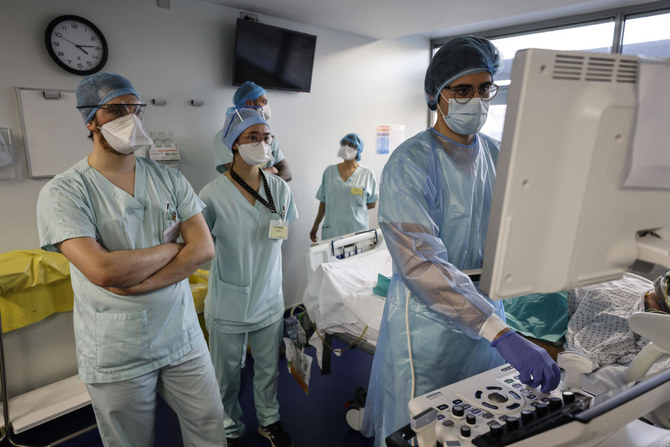
- That includes doctors, nurses and technicians at public hospitals
Death toll jumps to at least 48 as a search continues in southern China highway collapse
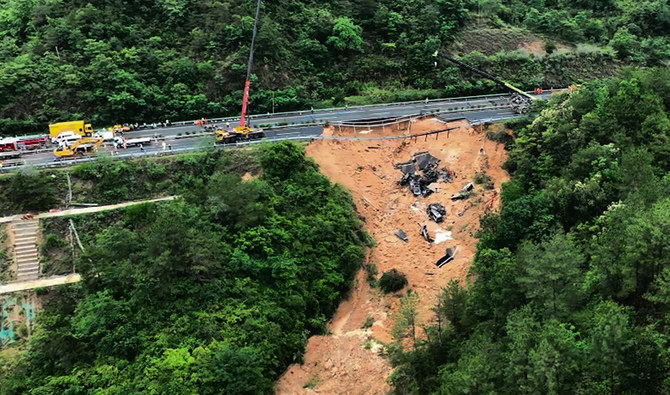
- One side of four-lane highway in Meizhou city gave way after a month of heavy rains
- Twenty-three vehicles fell down a steep slope, some sending up flames as they caught fire
BEIJING: The death toll from a collapsed highway in southeastern China climbed to 48 on Thursday as searchers dug for a second day through a treacherous and mountainous area.
One side of the four-lane highway in the city of Meizhou gave way about 2 a.m. on Wednesday after a month of heavy rains in Guangdong province. Twenty-three vehicles fell down a steep slope, some sending up flames as they caught fire. Construction cranes were used to lift out the burnt-out and mutilated vehicles.
Officials in Meizhou said three other people were unidentified, pending DNA testing. It wasn’t immediately clear if they had died, which would bring the death toll to 51. Another 30 people had non-life-threatening injuries.
The search was still ongoing, Meizhou city Mayor Wang Hui said at a late-afternoon news conference. No foreigners have been found among the victims, he said.
Search work has been hampered by rain and land and gravel sliding down the slope. The disaster left a curving earth-colored gash in the otherwise verdant forest landscape. Excavators dug out a wider area on the slope.
“Because some of the vehicles involved caught fire, the difficulty of the rescue operation has increased,” said Wen Yongdeng, the Communist Party secretary for the Meizhou emergency management bureau.
“Most of the vehicles were buried in soil during the collapse, with a large volume of soil covering them,” he said.
He added that the prolonged heavy rainfall has saturated soil in the area, “making it prone to secondary disasters during the rescue process.”
Over 56 centimeters (22 inches) of rain has fallen in the past four weeks in the county where the roadway collapsed, more than four times as much as last year. Some villages in Meizhou flooded in early April, and the city has seen more rain in recent days.
Parts of Guangdong province have seen record rains and flooding in the past two weeks, as well as hail. A tornado killed five people in Guangzhou, the provincial capital, during rain and hail storms last weekend.
The highway section collapsed on the first day of a five-day May Day holiday, when many Chinese are traveling at home and abroad.
Chinese leader Xi Jinping said that all of China’s regions should improve their monitoring and early warning measures and investigate any risks to ensure the safety of the public and social stability, state broadcaster CCTV said.
UK Veteran’s Minister Mercer to risk jail over Afghanistan inquiry
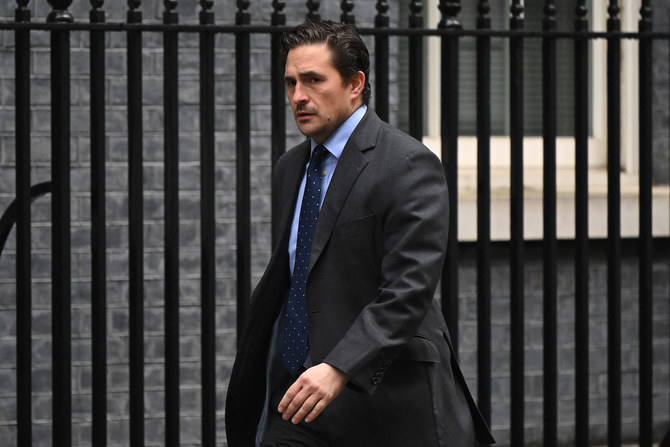
- Friends suggest minister will refuse to hand over identities of whistleblowers over fears for their well-being
- Mercer faces potential 52-week jail term, which would cost him his role as a minister and MP
LONDON: UK Veteran’s Minister Johnny Mercer will risk prison by not revealing the identities of whistleblowers to an inquiry investigating the killings of innocent people in Afghanistan.
The Times reported that friends of the MP had suggested he would rather be a “man of integrity” over the matter ahead of a deadline to hand the names to the inquiry, chaired by Lord Justice Haddon-Cave, next week.
Mercer has already given evidence to the inquiry, which is investigating allegations of extrajudicial killings and cover-ups by UK Special Forces between 2010 and 2013.
Appearing in February, he said a Special Forces soldier told him that in 2017 he was asked to carry a weapon to plant on an unarmed civilian to make them seem like an enemy combatant. He refused to reveal the source and others out of fear for their safety, with suggestions that some may be suffering from post-traumatic stress disorder and could be mentally vulnerable.
Haddon-Cave gave Mercer until April 5 to reveal the names, which was later extended. Failure to comply, he was warned, could result in a year-long prison term, which would cost him his job as a minister and his position as an MP. He could also face a fine.
One friend of the MP told The Times: “The inquiry doesn’t seem to realise that nothing will destroy their authority more than putting the veterans’ minister in the dock — the one man the military community trusts.
“If they do this, no one from the military community will want to co-operate with the inquiry. They seem to think Mercer will fold under the pressure and they will get their way. But he won’t. He will go down as a man of integrity and the inquiry will lose all support.”
Former Armed Forces Minister James Heappey said Mercer should reveal the identities of his sources.
“I admire Johnny enormously for the way that he has done politics under his own rules with an incredible sense of mission … He is a remarkable man but on this particular point I think for him, for his family and actually for the credibility of the inquiry I think he does need to disclose these names,” Heappey said.
On Friday, the inquiry will examine the Ministry of Defence’s failure to provide evidence to it on time. It is still waiting to hear from senior officials, including former Defence Secretary Ben Wallace.
It has also heard allegations that Gen. Gwen Jenkins, future national security advisor and former Special Boat Service head, locked away a report into claims of extrajudicial killings instead of passing it to military police.
Mercer also suggested during the inquiry, which began in December 2022, that the next head of the UK Army Lt. Gen. Sir Roly Walker had given “unbelievable” testimony over claims that Special Air Service personnel had killed unarmed Afghans.
An investigation by The Times, meanwhile, has suggested that former members of specialist Afghan Army units CF 333 and ATF 444 could provide crucial witness testimony to the inquiry but that their subsequent relocation from Afghanistan was overseen by MoD officials in a potential conflict of interest.
Many had their asylum claims to come to the UK rejected, a decision now under review.
Arrests made at protests against UK arms sales to Israel
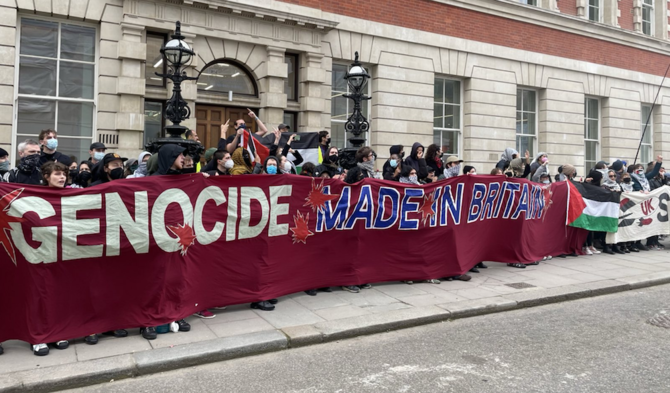
- Police in London, Glasgow called to deal with demonstrations
- ‘Protesters must stay within the law,’ Metropolitan Police says
LONDON: Police in London said they made three arrests at demonstrations held on Wednesday to protest against the sale of UK arms to Israel.
Protesters gathered outside the offices of the Department for Business and Trade in central London and more than 1,000 workers and trade unionists held protests at sites linked to BAE Systems across the UK.
“We are policing a protest in Admiralty Place and Horse Guards Parade,” the Metropolitan Police said in a statement.
“Officers have made three arrests after protesters blocked access to a building. Protesters must stay within the law.”
Police Scotland also confirmed its officers were called to a site in Glasgow to deal with protesters on Wednesday.
Members of Workers for a Free Palestine said the group was “escalating its tactics” by targeting BAE Systems cities and the British government department on the same day, the Independent reported.
“Our movement forced the issue of an arms embargo onto the table and polling shows the majority of the British public want to see arms sales to Israel banned, yet the government and also the Labour Party continue to ignore the will of the people,” a WFP protester named Tania, who took to the streets in London, told the newspaper.
“The government has sought to play down the scale of its arms supplies to Israel but the reality is UK arms and military support play a vital role in the Israeli war machine and evidence that three British aid workers were killed by a drone partly produced in the UK shows the extent of British complicity in Israel’s genocide,” she said.
Another protester, named Jamie, who was demonstrating in Glasgow, said: “Our fundamental aim is for the UK government to introduce an arms embargo. It’s the morally right thing to do.
“It’s vital that action is taken. It’s been almost seven months of death and destruction in Palestine and the idea that that is being committed by weapons that are being produced in our neighborhoods is horrifying.
“Our long-term goal is an arms embargo from the government but our short-term aim here today is to just disrupt business as usual for BAE, to disrupt the manufacture, to cost them time, cost them money and slow down the trade of weapons to Israel.”
BAE Systems said it respected people’s “right to protest peacefully” and that its arms exports complied with regulations.
“The ongoing violence in the Middle East is having a devastating impact on civilians in the region and we hope the parties involved find a way to end the violence as soon as possible,” it said.
“We operate under the tightest regulation and comply fully with all applicable defense export controls, which are subject to ongoing assessment.”
US defends talking to Taliban in Afghanistan
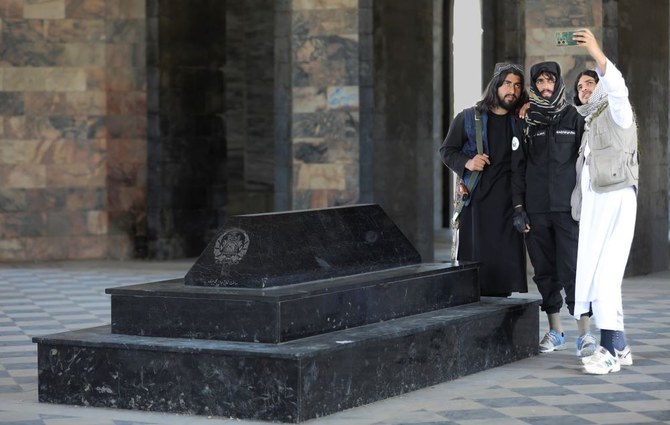
- Dialogue works in US interests, supports Afghan people, State Department says
- Taliban took power in 2021 following withdrawal of US-led coalition
LONDON: The US State Department has defended talking to the Taliban in order to serve Washington’s interests in Afghanistan and the wider region.
The department’s principal deputy spokesperson, Vedant Patel, told reporters that talking with the group not only worked in US interests but supported “the Afghan people.”
The Taliban took control of Afghanistan in 2021 following the withdrawal of US-led coalition forces and the collapse of the Western-backed Afghan government.
They have drawn significant hostility on the international stage for their repression of people, especially their treatment of women and girls, limits on education and reintroduction of violent punishment.
Some fear engaging with the Taliban could lend them legitimacy, but Patel said dialogue between the group and the US “allows us to speak directly with the Taliban, and it’s an opportunity for us to continue to press for the immediate and unconditional release of US nationals in Afghanistan, including those who we have determined to be wrongfully detained.”
“We’ll also use those opportunities to directly talk about the Taliban’s commitments to counterterrorism and of course, as always, human rights is also on the agenda,” he said.
British police officer pleads guilty to terror charges for showing support for Hamas
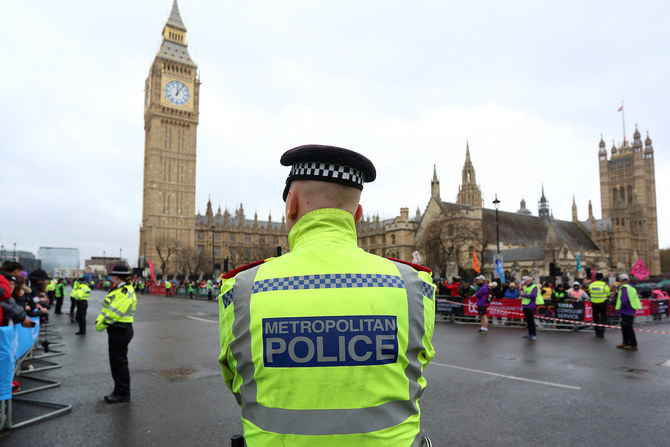
- Adil pleaded guilty in Westminster Magistrates’ Court to two counts of publishing an image in support of a proscribed organization in violation of the Terrorism Act
- Two other police officers who were concerned by the images reported Adil to superiors
LONDON: A British police officer pleaded guilty Thursday to terror charges for showing support on social media for Hamas, which is designated a terror group and banned in the UK.
West Yorkshire constable Mohammed Adil admitted sharing two images on WhatsApp supporting the group three weeks after Hamas and other Palestinian militants stormed into Israel on Oct. 7 and killed about 1,200 people and seized some 250 hostages.
Adil, 26, pleaded guilty in Westminster Magistrates’ Court to two counts of publishing an image in support of a proscribed organization in violation of the Terrorism Act.
In messages shared on WhatsApp stories with nearly 1,100 contacts, Adil posted images of a fighter wearing a Hamas headband, prosecutor Bridget Fitzpatrick said.
“Today is the time for the Palestinian people to rise, set their paths straight and establish an independent Palestinian state,” an Oct. 31 post said, apparently quoting the leader of Hamas’ military wing.
A second post on Nov. 4 was said to quote a Hamas military spokesperson.
Two other police officers who were concerned by the images reported Adil to superiors, Fitzpatrick said. He was arrested in November and has been suspended from the force.
“I accept that at the time of the offending you were of good character,” Chief magistrate Paul Goldspring told Adil, though he said he may impose a prison term when he is sentenced June 4.
Adil was released on bail.



